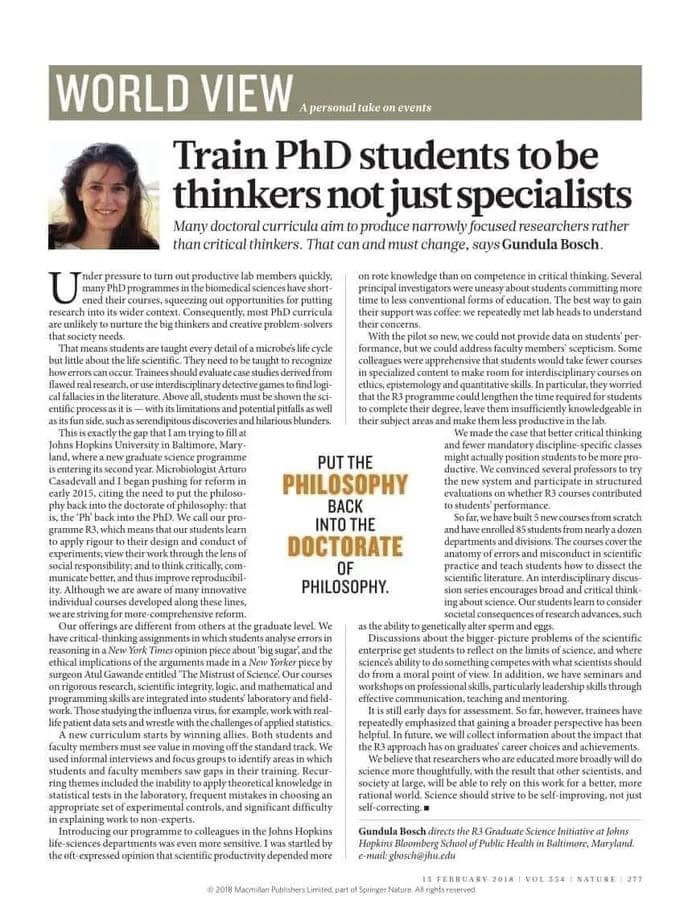
By Shahabuddin Amerudin
Introduction
The pursuit of a doctoral degree has long been associated with the idea of becoming an expert in a specific field of study. While specialization is undoubtedly crucial for advancing knowledge and innovation, there is a growing concern that many doctoral programs prioritize producing narrow specialists rather than fostering critical thinkers. Gundula Bosch argues that it’s time for a shift in the approach to training PhD students – a shift that emphasizes cultivating holistic thinking and the ability to apply knowledge across disciplines. This article delves into the importance of training PhD students to be thinkers, not just specialists, and explores the ways in which doctoral curricula can be reimagined to achieve this goal.
The Predicament of Narrow Specialization
In today’s rapidly evolving world, the challenges we face are often complex and interconnected, spanning multiple fields of study. Yet, the traditional structure of many PhD programs encourages students to dive deeply into a single area of research. While this depth of knowledge is essential, it can inadvertently lead to tunnel vision – a focus so narrow that it becomes difficult to recognize the broader implications and potential applications of one’s work.
The Need for Critical Thinkers
Critical thinking is a fundamental skill that transcends disciplinary boundaries. It involves the ability to analyze, synthesize, and evaluate information objectively, enabling individuals to make informed decisions and solve problems effectively. A PhD program that prioritizes critical thinking equips students with the tools to approach complex issues from multiple angles, consider alternative perspectives, and draw connections between seemingly disparate ideas. These skills are not only valuable in academia but also in various professional settings, where the ability to adapt and think critically is highly sought after.
Interdisciplinary Collaboration and Innovation
The challenges of the modern world often require interdisciplinary collaboration to develop comprehensive solutions. Without a foundation in critical thinking and the capacity to communicate across disciplines, experts may struggle to collaborate effectively. By training PhD students to think beyond their immediate research focus, universities can foster an environment where innovation thrives. Graduates with a broader perspective are better equipped to bridge gaps between disciplines, facilitating the exchange of ideas and the emergence of innovative solutions.
Rethinking Doctoral Curricula
To transform PhD students into thinkers rather than just specialists, universities need to reconsider the structure and content of their doctoral programs. Here are a few strategies to consider:
- Interdisciplinary Seminars: Introduce seminars or workshops that encourage students from diverse fields to interact, share insights, and explore collaborative opportunities.
- Research Ethics and Societal Impact: Include coursework that prompts students to consider the ethical implications of their research and how it can positively influence society.
- Communication Training: Provide training in effective communication, enabling students to convey complex ideas to both specialized and non-specialized audiences.
- Project-Based Learning: Incorporate projects that require students to tackle real-world problems, encouraging them to apply their expertise in practical ways.
- Mentorship and Guidance: Assign mentors who can guide students not only in their research but also in broadening their intellectual horizons.
Conclusion
The role of a PhD program extends beyond creating experts in a specific field – it should aim to produce well-rounded thinkers who can tackle complex challenges with insight and creativity. While specialization remains vital, the emphasis on critical thinking and interdisciplinary collaboration can transform doctoral graduates into catalysts for positive change in academia and society. By reimagining doctoral curricula and fostering an environment that values holistic thinking, universities can pave the way for a new generation of scholars who are not just specialists but also visionary thinkers.
Suggestion for Citation: Amerudin, S. (2023). Train PhD Students to Be Thinkers, Not Just Specialists. [Online] Available at: https://people.utm.my/shahabuddin/?p=6848 (Accessed: 31 August 2023).

